1061 scholarly books by Catholic University of America Press and 18
have author last names that start with V
1061 scholarly books by Catholic University of America Press and 18
1061 scholarly books by Catholic University of America Press
18 have author last names that start with V have author last names that start with V
18 have author last names that start with V have author last names that start with V
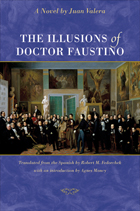
The Illusions of Doctor Faustino
Juan Valera
Catholic University of America Press, 2008
Translated from the Spanish by Robert M. Fedorchek with an introduction by Agnes Moncy
[more]
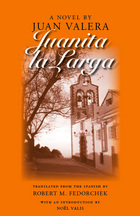
Juanita la Larga
a Novel
Juan Valera
Catholic University of America Press, 2006
Juanita la Larga (1896), the third of Juan Valera's eponymous novels with a female protagonist, unfolds in a small town in nineteenth-century Spain and tells the story of a young girl's romance with a wealthy widower many years her senior.
[more]
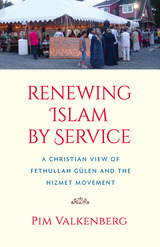
Renewing Islam by Service
Pim Valkenberg
Catholic University of America Press, 2015
Renewing Islam by Service offers a theological account of the contemporary Turkish faith-based service movement started by Fethullah Gülen, and placed against the backdrop of changes in modern Turkish society. The life and works of Gülen are analyzed against the background of developments in Turkish society, and of spiritual Islamic tendencies in the transition from the Ottoman empire to the secular republic. Pim Valkenberg includes stories of his personal experiences with supporters of this movement, in a number of dierent countries, and analyzes the spiritual practices and the faith-based service of this movement that is also compared to some important Christian religious movements.
[more]
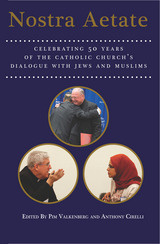
Nostra Aetate
Pim Valkenberg
Catholic University of America Press, 2016
The contents of this book originated in a conference at the Catholic University of America in May 2015. The essays and lectures contained within focus on the relationships of the Catholic Church with the other "Abrahamic" faiths, primarily Islam and Judaism. There is some discussion of the Asian religions as well. This volume, in structure, loosely follows the document Nostra Aetate itself. The first part of the book gives a broad view of the document and its importance. The following parts concentrates on the relationships between the Catholic Church and the Asian, Muslim and Jewish religions. The concluding section of the book surveys the reception Nostra Aetate received in various ecclesial and academic contexts.
[more]
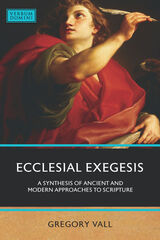
Ecclesial Exegesis
A Synthesis of Ancient and Modern Approaches to Scripture
Gregory Vall
Catholic University of America Press, 2022
There is broad support today for the idea that biblical scholarship ought to be informed by the faith of the Church and serve the life of the Church. In a word, it should be ecclesial. There is far less agreement, however, when one asks how this goal is to be achieved and what ecclesial exegesis ought to look like. In 1988, Joseph Ratzinger put forth his “Method C” proposal, calling for the development of a new exegetical and hermeneutical synthesis. This would be neither a retreat to the patristic-medieval approach (Method A) nor the continued hegemony of the historical-critical approach (Method B). The latter must be purified of its positivism through a transformational encounter with the former, so that the gifts of both might be released for the life of the Church. Such a synthesis, Ratzinger claimed, would require the philosophical, theological, exegetical, and hermeneutical work of “at least a whole generation” of scholars.
Gregory Vall has devoted over thirty years to the development of ecclesial exegesis, and the present volume represents the mature fruit of his labor. Over against those who treat Dei Verbum as Vatican II’s endorsement of the historical-critical method, he demonstrates that the dogmatic constitution actually points to something very much like Ratzinger’s Method C. Employing a dialogic movement between the inductive-exegetical and the deductive-dogmatic, Vall offers nine studies that bring to the surface issues such as the relationship between Old Testament and New Testament, literal sense and spiritual sense, and Scripture and Tradition. While Vall brings theological knowledge and hermeneutical skill to the quest for Method C, he also provides a great deal of valuable exegesis of both testaments. Ecclesial Exegesis is not simply another book of theory. It demonstrates how Method C can be done.
[more]
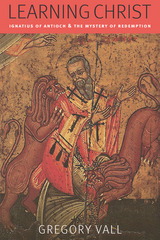
Learning Christ
Gregory Vall
Catholic University of America Press, 2013
Learning Christ represents a thorough reevaluation of Ignatius as author and theologian, demonstrating that his seven authentic letters present a sophisticated and cohesive vision of the economy of redemption. Gregory Vall argues that Ignatiuss thought represents a vital synthesis of Pauline, Johannine, and Matthean perspectives while anticipating important elements of later patristic theology. Topics treated in this volume include Ignatiuss soteriological anthropology, his Christology and nascent Trinitarianism, his nuanced understanding of the relationship between Judaism and Christianity, and his ecclesiology and eschatology.
[more]
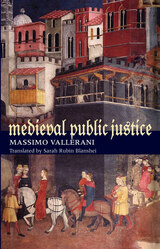
Medieval Public Justice
Massimo Vallerani
Catholic University of America Press, 2012
In a series of essays based on surviving documents of actual court practices from Perugia and Bologna, as well as laws, statutes, and theoretical works from the 12th and 13th centuries, Massimo Vallerani offers important historical insights into the establishment of a trial-based public justice system.
[more]
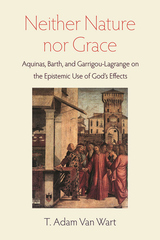
Neither Nature nor Grace
Aquinas, Barth, and Garrigou-Lagrance on the Epistemic Use of God's Effects
T. Adam Van Wart
Catholic University of America Press, 2021
Neither Nature nor Grace operates at the intersection of systematic and philosophical theology, exploring in particular how St. Thomas Aquinas variously uses the latter in service to the clarification and faithful advancement of the former. More specifically, Neither Nature nor Grace explores the overlooked logical difficulties that have followed the late modern debates in ecumenical Christian theology as to whether knowledge of God is available solely through God’s gracious self-revelation (e.g., Jesus Christ and Holy Scripture), or through revelation and the deliverances of natural reason. Van Wart takes the prominent French Dominican Reginald Garrigou-Lagrange as paradigmatic for the case that knowledge of God can be had by both revelation and natural reason. Representing the opposing position, that God can only be known through divine revelation, Van Wart highlights the work of influential Protestant theologian Karl Barth. By placing these two imposing 20th century theologians in conversation, and by providing a careful theo-philosophical analysis of the logical mechanics of each thinker’s respective arguments, Van Wart shows how both inadvertently overreach their self-professed epistemological bounds and just so run into significant problems maintaining the coherence of their relative theological positions. That is, against their expressed intentions to the contrary, both thinkers unwittingly evacuate the divine essence of the mystery Christian tradition has always previously claimed it to have, effectively reducing the being of God to mere creaturely being writ large. As a contrasting corrective to this problem, Van Wart proffers a constructive grammatical reading of Aquinas’s measured account of the crucial but often overlooked logical differences between what can be said of the divine, on the one hand, versus what can be known of God, on the other. While many recent works have attempted to solve the ongoing arguments which Garrigou-Lagrange and Barth epitomize regarding the epistemic use of God’s effects, Van Wart’s contribution constructively pushes the conversation to a different level in showing how Aquinas’s grammar of God provides a salutary means of dissolving and moving beyond these contentious debates altogether.
[more]
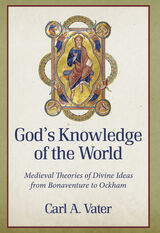
God's Knowledge of the World
Medieval Theories of Divine Ideas from Bonaventure to Ockham
Carl A. Vater
Catholic University of America Press, 2022
A theory of divine ideas was the standard Scholastic response to the question how does God know and produce the world? A theory was deemed to be successful only if it simultaneously upheld that God has perfect knowledge and that he is supremely simple and one. In articulating a theory of divine ideas, Carl Vater answers two sorts of questions. First, what is an idea? Does God have ideas? Are there many divine ideas? What sort of existence does an idea enjoy? Second, he answers questions about the scope of divine ideas: does God have ideas of individuals, species, genera, accidents, matter, evil, etc.? How many divine ideas are there?
These questions cause the Scholastic authors to articulate clearly, among other things, their positions on the nature of knowledge, relation, exemplar causality, participation, infinity, and possibility. An author’s theory of divine ideas, then, is the locus for him to test the coherence of his metaphysical, epistemological, and logical principles. Many of the debates over divine ideas have their roots in disagreements over whether a given theory adequately articulates one of the underlying positions or the overall coherence of those positions. Peter John Olivi, for example, argues that his predecessors’ theories of knowledge and theories of relations are at odds, and this critique results in a major shift in theories of divine ideas.
God's Knowledge of the World examines theories of divine ideas from approximately 1250–1325 AD (St. Bonaventure through Ockham). It will be the only work dedicated to categorizing and comparing the major theories of divine ideas in the Scholastic period.
[more]
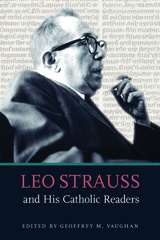
Leo Strauss and His Catholic Readers
Geoffrey M. Vaughan
Catholic University of America Press, 2018
This book looks at the work and influence of Leo Strauss in a variety of ways that will be of interest to readers of political philosophy. It will be of particular interest to Catholics and scholars of other religious traditions. Strauss had a great deal of interaction with his contemporary Catholic scholars, and many of his students or their students teach or have taught at Catholic colleges and universities in America. Leo Strauss and His Catholic Readers brings together work by scholars from two continents, some of whom knew Strauss, one of whom was his student at the University of Chicago. The first section of essays considers Catholic responses to Strauss’s project of recovering Classical natural right as against modern individual rights. Some of the authors suggest that his approach can be a fruitful corrective to an uncritical reception of modern ideas. Nevertheless, most point out that the Catholic cannot accept all of Strauss’s project. The second section deals with areas of overlap between Strauss and Catholics. Some of the chapters explore encounters with his contemporary scholars while others turn to more current concerns. The final section approaches the theological-political question itself, a question central to both Strauss’s work and that of the Catholic intellectual tradition. This section of the book considers the relationship of Strauss’s work to Christianity and Christian commitments at a broader level. Because Christianity does not have an explicit political doctrine, Christians have found themselves as rulers, subjects, and citizens in a variety of political regimes. Leo Strauss’s return to Platonic political philosophy can provide a useful lens through which his Catholic readers can assess what it means for there to be a best regime.
[more]
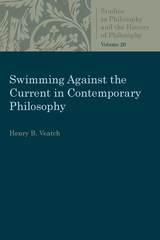
Swimming Against the Current in Contemporary Philosophy
Harry B. Veatch
Catholic University of America Press, 2018
Looks at being a follower of Aristotle or St. Thomas Aquinas in a modern philosophical world.
[more]

A Guide to John Henry Newman
His Life and Thought
Juan R. Velez
Catholic University of America Press, 2022
John Henry Newman (1801-1890), renowned thinker and writer, Anglican clergyman and later Roman Catholic priest and cardinal, has had a lasting influence on both Anglicans and Catholics, in the fields of literature, education, and theology. On October 13, 2019, Pope Francis declared him a saint in Rome.
Appealing to both the student and the scholar, A Guide to John Henry Newman provides a wide range of subjects on Newman’s life and thought relevant for our times and complementary to biographies of Newman. The contributors include authors from many different disciplines such as theology, education, literature, history, and philosophy, highlighting the wide range of Newman’s work. These authors offer a positive assessment of Newman’s thought and contribute to the discussion of the recent scholarship of others.
A Guide to John Henry Newman will interest educated readers and professors alike, and serve as a text for college seminars for the purpose of studying Newman.
[more]
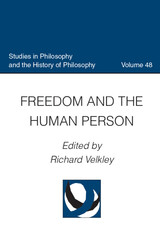
Freedom and the Human Person
Richard Velkley
Catholic University of America Press, 2007
The present collection seeks to contribute toward finding that distance by making the tradition of thought more a living reality and not an object of arid analyses. Unlike most collections the present one transcends disciplinary boundaries, as it acknowledges the interconnectedness of philosophical, theological, and political arguments on these themes.
[more]

Robert of Arbrissel
A Medieval Religious Life
Bruce L. Venarde
Catholic University of America Press, 2003
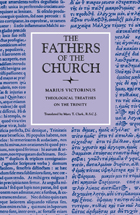
Theological Treatises on the Trinity
Marius Victorinus
Catholic University of America Press, 1981
No description available
[more]
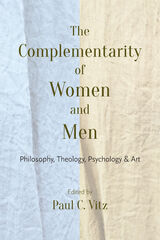
The Complementarity of Women and Men
Philosophy, Theology, Psychology, and Art
Paul C. Vitz
Catholic University of America Press, 2021
The Complementarity of Women and Men provides a Catholic Christian case that men and women are in certain respects quite different but also have a positive, synergistic complementary relationship. Although differences and their mutually supporting relationships are focused on throughout the volume, men and women are assumed to have equal dignity and value. This underlying interpretation comes from the familiar, basic theological position in Genesis that both sexes were made in the image of God.
After a cogent philosophical introduction to complementary differences by J. Budziszewski, this position is developed from theological, philosophical, and historical perspectives by Sr. Prudence Allen. Next Deborah Savage, building upon the writings of St. John Paul II, gives a strong theological basis for complementarity. This is followed by Elizabeth Lev’s chapter presenting new and surprising art history evidence from the paintings of Michelangelo in the Sistine Chapel supporting the complementarity interpretation. A final chapter by Paul Vitz documents and summarizes the scientific evidence supporting sexual difference and complementarity in the disciplines of psychology and neuroscience.
As a consequence of both the individual chapters and the integrated understanding they present The Complementarity of Women and Men is a significant contribution to the important, complex, contemporary debate about men, women, sex, and gender.
[more]
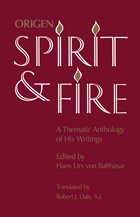
Origen
Spirit and Fire
Hans Urs von Balthasar
Catholic University of America Press, 1984
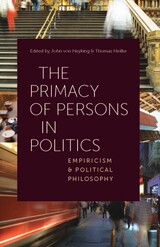
The Primacy of Persons in Politics
John von Heyking
Catholic University of America Press, 2013
Taking as their departure point the political-philosophical analyses of German scholar Tilo Schabert, the philosophical and empirical essays in this volume invite the reader to move beyond the sterile dichotomy of political activity as either pure will or as folded into a more manageable activity.
[more]
READERS
Browse our collection.
PUBLISHERS
See BiblioVault's publisher services.
STUDENT SERVICES
Files for college accessibility offices.
UChicago Accessibility Resources
home | accessibility | search | about | contact us
BiblioVault ® 2001 - 2024
The University of Chicago Press









